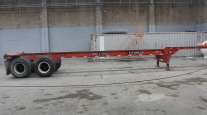Chassis Repair an Issue in Contract Talks Between Longshoremen’s Union, Carriers
This story appears in the March 19 print edition of Transport Topics.
The ongoing shift of intermodal chassis ownership from ocean carriers to truckers and lessors could encounter a new jolt as the International Longshoremen’s Association promised to keep the repairing of chassis a key negotiating issue in contract talks that begin next week.
Talks are slated to begin March 29 and 30 in Tampa, Fla., between the union and the United States Maritime Alliance, which negotiates on behalf of ocean carriers and terminal operators at ports ranging from Nova Scotia to Houston.
The union’s view of chassis is important because under the contract that expires on Sept. 30, ocean carriers are required to use union labor to maintain and repair chassis on the docks. However, at the same time, the ocean lines have been shifting the burden of chassis supply to truckers and lessors who aren’t covered by the union contract.
The chassis landscape began to change in 2009, when the largest ocean carrier, Maersk Line, began renting chassis instead of offering them at no charge to truckers. Some competitors followed suit, while others kept providing free chassis, and still others poured leased and owned chassis into an industry-managed pool called Consolidated Chassis Management.
The subsequent announcement in February by Maersk, a signatory to the ILA contract, that it planned to sell its chassis rental business to private equity firm Littlejohn & Co. prompted criticism from ILA President Harold Daggett on March 7 at a maritime conference.
“Let me tell you something,” Daggett said, according to speech text posted on the union Web site. “Big Harold was not pleased to read about Littlejohn.”
“The ILA is asked to engage as partners with our management counterparts,” he continued. “Yet, we in the ILA continue to see attacks, big and small on our jurisdiction and work historically belonging to us.”
“What obligation does Littlejohn have to the ILA?” he asked. “We intend to make certain Maersk and all our employers understand their obligation to us and to our members.”
Littlejohn didn’t return calls seeking comment, and Maersk spokesman Timothy Simpson declined to comment.
So did James Capo, CEO of the Maritime Alliance, who told TT, “It is my policy not to comment to the press or do interviews during negotiations.”
Curtis Whalen, executive director of American Trucking Associations’ Intermodal Motor Carriers Conference, explained that, historically, chassis maintenance was done on the port terminal premises, so that jurisdiction wasn’t an issue.
That’s changing with the new chassis supply approach, Whalen said.
“With ocean carriers getting out of the [chassis] business at the same time they are contractually obligated to the union, the people who control the land don’t want to keep [chassis] on the premises,” Whalen said.
Referring to Daggett’s comments, Whalen said, “With all of these interests trying to understand the [new chassis supply] model, that sort of grenade would certainly would create a problem.”
Whalen added that one unaddressed question is how the chassis evolution will affect leasing companies, because they haven’t signed the union agreement.
Keith Lovetro, president of chassis lessor Trac Intermodal, told TT he didn’t think Daggett’s comments would impede the change of the chassis ownership and supply.
“He’s advocating an agenda and will work toward that end for his members,” said Lovetro.
He added that, while the company doesn’t directly employ union members for maintenance, Trac “will certainly use ILA labor where we can” through separate agreements.
Flexi-Van Leasing Inc., the other major chassis lessor, didn’t respond to requests for comment.
Phil Wojcik, president of the CCM pool, said he didn’t believe chassis-maintenance jurisdiction questions would affect his operation because its members are signatories to the labor agreement.
Daggett also said that automation and container weight would be important issues in the talks, along with safety.




